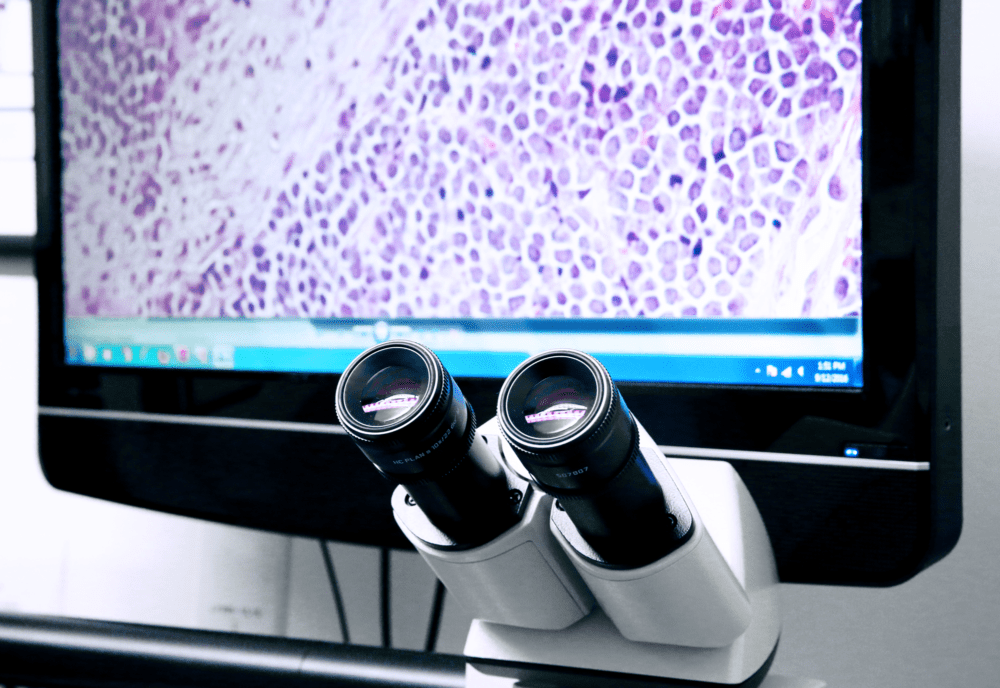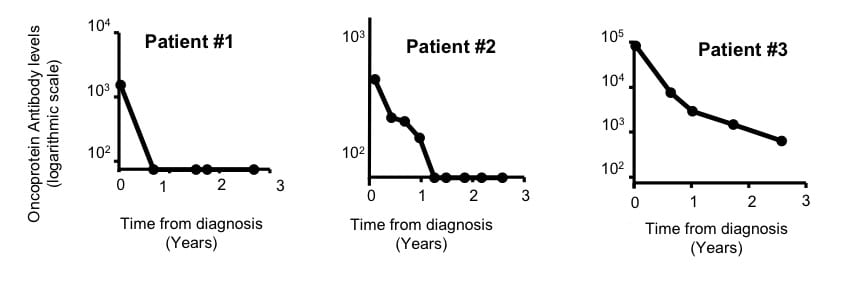
Serology test
Jump to Section:
Purpose of the Merkel polyomavirus serology test
The Merkel polyomavirus Merkel polyomavirus The Merkel cell polyomavirus (MCPyV) is a very common virus that is often on our skin. It is not known to cause any common problems. Very rarely, it can lead to Merkel cell carcinoma. serology test is a blood test that is helpful in managing MCC patients (whether they make these antibodies or not) so that possible disease recurrence can be detected early, when it can be most effectively treated. A baseline oncoprotein antibody antibody A highly specific protein made by our bodies that can recognize and bind to an agent such as a bacteria or virus. test (ideally within 2-3 months of when a patient had evidence of disease) is useful for all MCC patients. This is because patients who do not produce antibodies are at higher risk of having a recurrence and will need to be followed closely by imaging scans. In contrast, patients who produce oncoprotein antibodies can be followed over time using this test which decreases the need for imaging scans.
A portion of the Merkel polyomavirus–the “oncoprotein”–is present in about 80% of all MCC tumors. This portion of the virus is critical for most MCC tumors to grow. In 2010, we reported that antibodies that recognize this oncoprotein are present in the blood of 50% of newly diagnosed MCC patients. In contrast, oncoprotein antibodies are almost never present in people who have not had MCC.
After treating a patient with Merkel cell Merkel cell Merkel cells are found in the lower part of the epidermis. Although the exact function of Merkel cells is unknown, they are thought to be touch receptors. Also known as neuroendocrine cells, they have machinery similar to nerve cells and to hormone-secreting (endocrine) cells. cancer cancer A term used to describe diseases in which abnormal cells continually divide without normal regulation. Cancerous cells may invade surrounding tissues and may spread to other regions of the body via blood and the lymphatic system. , if oncoprotein antibodies had been present, they decrease rapidly in the blood. Typically, antibody levels fall by about 90% by one year after treatment, and continue to fall after that. On the other hand, if the cancer returns in a patient who previously had these antibodies, blood antibody levels increase rapidly. By comparing blood antibody levels at two time points, we can see if the cancer is in remission remission A disappearance of or decrease in the signs and symptoms of cancer. In complete remission, all signs and symptoms of cancer have disappeared; however, cancer may still be present in the body. In partial remission, only some signs and symptoms have gone away. or returning.
An introductory video on YouTube
We created a brief video overview of the Merkel virus serology test explaining the details of how the test (called AMERK) works, what it detects, and how this information can help monitor the status of patients with Merkel cell carcinoma Merkel cell carcinoma A skin cancer composed of cells that look microscopically similar to normal Merkel cells present in the skin. MCC was first described in 1972 and only in the 1990s was the CK20 antibody developed to make it easily identifiable by pathologists. Many doctors and patients are not aware of this cancer because of its recent description and relative rarity (~2,000 cases/year in the US--roughly 30 times less common than melanoma). About 40% of patients treated for MCC will experience a recurrence, making it far more aggressive than most other types of skin cancer, including melanoma. .
Serology in detail
In 2010, Paulson and others reported that oncoprotein antibodies increase and decrease with the amount of MCC present in a patient. Since that time, funded by a grant from the US National Cancer Institute, we have followed several hundred patients to determine how useful this test is in the “real world”. We have concluded that obtaining this test at baseline is useful for all MCC patients as it helps determine how they should be followed over time.
Below are graphs from our antibody study that summarize what it means when the test is falling, indeterminate (stable), or rising.
Below are graphs from three individual patients who did not recur and who had falling titers of oncoprotein antibodies.
Below are graphs from two individual patients who did experience a recurrence of their MCC and who had rising titers of oncoprotein antibodies.
Who this works for
Performing an oncoprotein antibody (AMERK) test at baseline (ideally within 2-3 months of when a patient had evidence of disease) is useful for all MCC patients. This is because patients who do not produce oncoprotein antibodies are at higher risk of having a recurrence and need to be followed closely by imaging scans. In contrast, patients who produce oncoprotein antibodies can be followed over time using this test which decreases the need for imaging scans, and can help discover recurrences when they are small.
Who this doesn’t work for
This test is not useful for detecting recurrence in MCC patients who do not make oncoprotein antibodies (as determined by a baseline test within a few months of evidence of disease).
Often used in conjunction with
All patients, regardless of whether or not they make oncoprotein antibodies, may sometimes need scans to detect MCC recurrences. When oncoprotein antibody levels go up, this indicates that there could be an MCC recurrence and an imaging scan should be performed.
What to do next
If you and your doctor determine that this test is appropriate, below are instructions on how this test can be ordered.
- Please review the test requirements:
https://testguide.labmed.uw.edu/public/view/AMERK - Ordering the test: Please complete the AMERK Requisition (link below) form in its entirety, including the address to send results to the ordering provider. Please include the clearly written name and NPI number of the ordering physician; this information is required to complete testing. Please ensure there are two patient identifiers on the form. The most common forms of patient ID are name and date of birth.
- Receiving results: Test results will be received by the ordering physician between 2-3 weeks from the testing date. The patient should receive results through the ordering physician’s care team. Contact information for the ordering physician should be added under “send report to” on the AMERK Requisition form. Please enter contact information for the ordering physician’s department that handles results. All information must be clearly legible.
- Questions: Contact the Client Support Services at 1-800-713-5198.
Download the form that will allow any medical facility to order the Merkel virus serology test.
Download Form
Serology FAQs
Click here to access the complete list of Serology FAQs. Listed below are some of the most common FAQs on serology.
FAQs
What is the Merkel virus?
The Merkel virus was first discovered in 2008 (by Patrick Moore and Yuan Chang’s group) and is now known to play a role in >80% of Merkel cell carcinomas (MCCs). The virus is commonly found on people’s normal-appearing skin and typically causes no problems. Important components of this virus include: The capsid protein (VP1) is a structural protein on the outer layer of the virus. The oncoprotein (T-antigen) is a separate protein encoded by the virus.
What is an antibody?
An antibody is a highly specific protein made by our bodies that can recognize and bind to an agent such as a bacteria or virus.
What is an antibody titer?
The antibody titer is the standard measure of how much of a particular antibody is in the blood. The titer value increases as the amount of that antibody increases in the blood.
What does the Merkel serology test detect?
This test detects antibodies to the oncoprotein of the Merkel virus in the blood.
Can serology be used to diagnose or screen for MCC?
The serology test is NOT meant for diagnostic or screening purposes, since MCC can only be diagnosed through a biopsy.
Who could benefit from the serology test?
This test is for patients with biopsy-proven MCC who want to monitor their disease status for recurrence.
Who should NOT receive the serology test?
This test is not useful for MCC patients who did not have oncoprotein antibodies at a time when they had evidence of MCC.
Clinical Publications
The following clinical publications and scientific research provide additional in-depth information about serology test.


